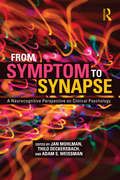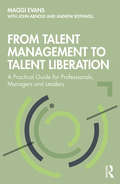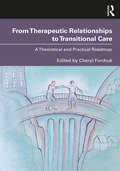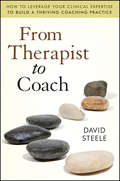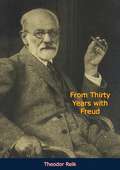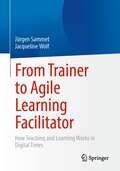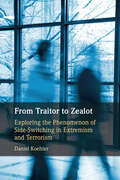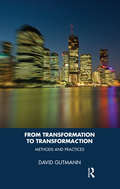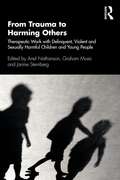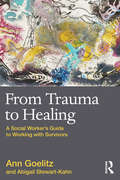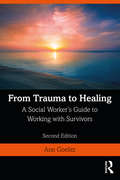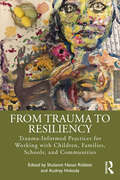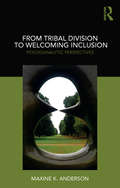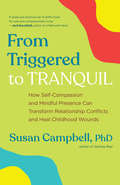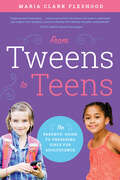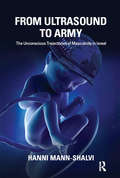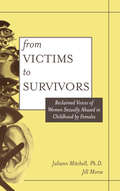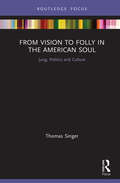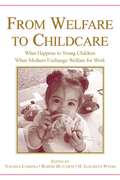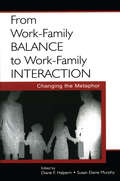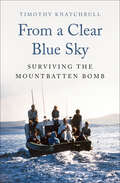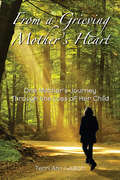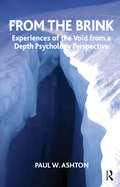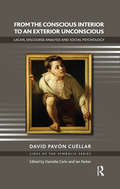- Table View
- List View
From Symptom to Synapse: A Neurocognitive Perspective on Clinical Psychology
by Thilo Deckersbach Jan Mohlman Adam WeissmanThis edited volume bridges the gap between basic and applied science in understanding the nature and treatment of psychiatric disorders and mental health problems. Topics such as brain imaging, physiological indices of emotion, cognitive enhancement strategies, neuropsychological and cognitive training, and related techniques as tools for increasing our understanding of anxiety, depression, addictions, schizophrenia, ADHD, and other disorders are emphasized. Mental health professionals will learn how to integrate a neurocognitive perspective into their clinical research and practice of psychotherapy.
From Talent Management to Talent Liberation: A Practical Guide for Professionals, Managers and Leaders
by John Arnold Andrew Rothwell Maggi EvansAs the pace of change increases and new business structures evolve, finding and harnessing people’s talent is becoming ever more important. From Talent Management to Talent Liberation presents a thoughtful and practical approach to talent. It provides compelling evidence for the limitations of talent management practice and offers talent liberation as an alternative approach. Talent Liberation is positioned through five premises that draw on the agile movement to provide a fundamental reappraisal of the talent agenda. These premises are then applied through a range of strategic and tactical tools such as the Talent Compass. By combining academic research, thought leadership and practical experience, this book will stimulate fresh thinking. Readers will be inspired to take action, using the simple tools to liberate more of the talent in their organisation and their teams. Leaders, HR professionals and individuals will benefit from the relevant insights shared here.
From Therapeutic Relationships to Transitional Care: A Theoretical and Practical Roadmap
by Cheryl ForchukThis text provides a foundational understanding of therapeutic relationships and the transitional discharge model (TDM), a person-centered, evidence-based model that supports a smooth transition from hospital to community for people with mental illness Starting with background into the ground-breaking work of Dr. Hildegard Peplau, the mother of modern psychiatric nursing, and moving towards a transdisciplinary transitional discharge perspective, chapters introduce students and practitioners to theoretical, historical, and current perspectives on therapeutic relationships as they relate to transitional care. These perspectives foreground empirical research and practical applications that can be implemented in hospital and community settings. The Appendix features an essential "TDM toolkit" with forms, learning topics, and checklists developed by programs that implement TDM. Essential reading for those studying psychiatric nursing, this book combines theory, research, and best practices into a "roadmap" for students across nursing and psychiatric disciplines to coordinate these systems without having to implement radical changes to practice.
From Therapist to Coach
by David SteelePraise for From Therapist to Coach"This book is very practical and helpful to the therapist who wants to make a change and feels a bit overwhelmed with the possibilities. The section on choosing a niche was illuminating and very exciting to me. I found it helpful to have the training options outlined so clearly, and the marketing section was extremely useful as well."--Shelley R. Cohen, LCSW, Beverly Hills, CA"This book has sparked a renewed passion for my work as I have struggled the past couple of years with how to incorporate coaching into my psychotherapy practice. I knew there must be a way to do it but lacked the 'how to.' Based on his years of experience and real insight, David Steele supplies the necessary tools to do so effectively as well as invaluable strategies to help avoid the pitfalls. Without hesitation, I highly recommend this as a book that you will return to time and time again as a handbook for your private practice as a therapist/coach."--Sharon O'Farrell, MIHA, Navan, IrelandA hands-on guide to helping therapists make the transition to a successful coaching practiceWritten for therapists by a therapist, From Therapist to Coach provides a convenient road map for professionals considering expanding or transitioning their practice to coaching.Drawing from his experience in providing relationship coach training to over 5,000 therapists, David Steele takes a practical approach to building a successful coaching business through traditional and creative strategies such as marketing, getting clients, choosing a niche, and much more.Here, therapists will find:A look at the differences between therapy and coachingExamples and insights that therapists can easily (and sometimes humorously) relate toDetails on setting fees; enrolling clients; maximizing private practice income; finding training; and much moreA focus on creative group services and business models suited to the various specialties and niches of personal coachingGuidance on how much to bill for servicesWith insight on the mistakes and pitfalls to avoid along the way, From Therapist to Coach is rich with examples, providing tips and practical steps to help clinicians in private practice move forward in their journey towards professional satisfaction.
From Thirty Years with Freud
by Theodor ReikOriginally published in 1940, From Thirty Years with Freud by Theodor Reik is the English translation of a collection of essays presenting the author’s memories of Freud. The book includes an unknown lecture of Freud, Freud as a critic of our culture, and diverse subjects treated from the psychoanalytic standpoint. Several of these articles have appeared elsewhere before, mostly in German. The final group of essays, originally dedicated to Freud on his successive birthdays, deal with embarrassment in greeting, the latent meaning of elliptical distortion, and the nature of Jewish wit.“In this series of letters, essays, and comments, Reik endeavors to convey something of his own intimate veneration of Freud to the lay reader. The book…breathes sincerity, honesty, and scientific curiosity.”—Karl Menninger
From Trainer to Agile Learning Facilitator: How Teaching and Learning Works in Digital Times
by Jacqueline Wolf Jürgen SammetPure face-to-face training is increasingly being supplemented or even replaced by modern forms of learning such as blended learning, online training, e-learning and informal learning. What does this mean for you as a trainer (lecturer, speaker, personnel developer)?This reference book shows how the job description of the trainer is changing due to digitalisation and which competences you need as a trainer to be successful in the "learning revolution". After all, specialist knowledge paired with classroom didactics is no longer enough.This work takes you by the hand to become a learner again as a trainer and to develop into an "agile learning facilitator". It gives you orientation in the digital "trainer competence jungle". In a practical and clearly understandable way, you will receive both theoretical background knowledge and practical implementation possibilities for the modernisation of your continuing education programme.
From Traitor to Zealot: Exploring the Phenomenon of Side-Switching in Extremism and Terrorism
by Daniel KoehlerWhat makes a neo-Nazi become a convinced anti-fascist or a radical left-winger become a devout Salafist? How do they manage to fit into their new environment and gain acceptance as a former enemy? The people featured in this book made highly puzzling journeys, first venturing into extremist milieus and then deciding to switch to the opposite side. By using their extraordinary life-stories and their own narratives, this book provides the first in-depth analysis of how and why people move between seemingly opposing extremist environments that can sometimes overlap and influence each other. It aims to understand how these extremists manage to convince their new group that they can be trusted, which also allows us to dive deep into the psychology of extremism and terrorism. This fascinating work will be of immense value to those studying radicalization and counter-radicalization in terrorism studies, social psychology and political science.
From Transformation to TransformaCtion: Methods and Practices
by David GutmannThis book describes a journey of discovery from transformation to transformaction that extends and enhances the life of the organization. It serves as an exploration of transformation from its relation with chaos and the beginning to its currency with power and authority.
From Trauma to Harming Others: Therapeutic Work with Delinquent, Violent and Sexually Harmful Children and Young People
by Ariel NathansonFrom Trauma to Harming Others shows the approach of professionals from the world-renowned Portman Clinic, which specializes in work with violence, delinquency and sexual acting out. This book focuses on the intricacies of working with young people who display such worrying behaviours. Written by experienced and eminent authors, the chapters unpack central theories and open up original ideas describing a range of work with sexual offenders, compulsive pornography users and violent young people. The central theme of the book is trauma and how acting out can be understood as a way of managing the psychic pain of such trauma. The chapters are ingrained with understandings from the classical psychoanalytic traditions of the Portman and Tavistock Clinics, together with more recent thinking about trauma, rooted in neurobiological, developmentally and trauma informed theories. They emphasize the need for awareness of both the victim of trauma and the perpetrator within the same person presenting for help, while panning treatment. With insights and examples from experienced clinicians, this book will be of value to all those working with traumatized, acting out young people.
From Trauma to Healing: A Social Worker's Guide to Working with Survivors
by Ann GoelitzFrom Trauma to Healing: A Social Worker’s Guide for Working With Survivors is the next significant publication on trauma in the field of social work. Since September 11 and Hurricane Katrina, social workers have come together increasingly to consider how traumatic events impact practice. From Trauma to Healing is designed to provide direction in this process, supporting both the field’s movement towards evidence-based practice and social workers’ growing need to be equipped to work with trauma. It does so in the practical-guide format already proven to be compelling to social work students, educators, and practitioners, providing case examples, and addressing social workers’ unique ecological approach.
From Trauma to Healing: A Social Worker's Guide to Working with Survivors
by Ann GoelitzThis updated edition of From Trauma to Healing is a comprehensive and practical guide to working with trauma survivors in the field of social work. Since September 11th and Hurricane Katrina, social workers have increasingly come together to consider how traumatic events impact practice. This text is designed to support the process, with a focus on evidence-based practice that ensures professionals are fully equipped to work with trauma. Highlights of this new edition include brand new chapters on practitioner bias and vulnerability, standardized assessment methodologies, and crisis management, as well as a focus on topics crucial to social workers such as Trauma Informed Care (TIC) and Adverse Childhood Events (ACES). The text also offers additional resources including chapter practice exercises and a sample trauma course syllabus for educators. With fresh examples and discussion questions to help deal with traumatic events in practice, including interventions that may be applicable to current and future 21st century world events, such as the coronavirus pandemic, From Trauma to Healing, 2nd edition remains an essential publication on trauma for students and social workers alike.
From Trauma to Resiliency: Trauma-Informed Practices for Working with Children, Families, Schools, and Communities
by Shulamit Natan Ritblatt and Audrey HokodaFrom Trauma to Resiliency integrates research and practice of trauma-informed care, reviewing the neuroscience of trauma and highlighting relationship-based interventions for diverse populations that have faced multiple traumas. Chapters explore the experiences of oppressed groups that include survivors of abuse, war, poverty, Indigenous youth, Middle Eastern refugee mothers, individuals who identify as sexual and/or gender minorities (SGM), and children and youth involved in child welfare, foster care, and juvenile justice systems. In each chapter, contributors provide strengths-based, trauma-informed strategies that can be used in clinical settings, school-based programs, and in urban communities where food insecurity, limited access to health services, and community violence are prevalent. Professionals and students in counseling, social work, psychology, child welfare, education, and other programs will come away from the book with culturally affirming, trauma-informed interventions and models of care that promote well-being and resilience.
From Tribal Division to Welcoming Inclusion: Psychoanalytic Perspectives
by Maxine K. AndersonFrom Tribal Division to Welcoming Inclusion: Psychoanalytic Perspectives provides a fascinating contribution to our understanding of the increasingly polarized and divisive nature of global politics. By describing the significant role of early mental mechanisms in interactions between the individual and society, the book offers a unique understanding of how our early mental life explains the social, cultural and political positions we assume later. Splitting and projection are early defences meant to shield the growing mind from unbearable aspects of reality, but they hinder our capacity for open-minded thought, and in contributing to the dangerous atmosphere of "us versus them", introduce tribal myths of an innocent group and external persecutors. The book illustrates these distortions of reality using a range of vignettes, notably the myth of white supremacy and the savage legacy of the Civil War in the United States. Gaining support from the work of Wilfred Bion, the book emphasises the need for integration of mind and the restoration of our capacity to face painful realities, including one’s own violence and hatred. This psychoanalytic study provides a balm for turbulent times. It will be of great interest to researchers and interested readers in the broad field of psychoanalysis, as well as those in the fields of political science, cultural studies and anthropology.
From Triggered to Tranquil: How Self-Compassion and Mindful Presence Can Transform Relationship Conflicts and Heal Childhood Wounds
by Susan CampbellA Therapy-Tested, Real-World Approach to Defusing Anxiety and Anger Reactions At home, at work, or even out shopping, we&’ve all experienced a moment when we&’ve gone from feeling just fine to feeling out of control. Something inside us shifts. We instantly feel hurt, angry, shut down, or frozen. In these moments, we&’ve been triggered, according to therapist and bestselling author Susan Campbell. In From Triggered to Tranquil, she offers a no-blame approach to conflicts and misunderstandings, empowering us to explore triggers and trauma responses and use these as portals to growth and self-compassion. This accessible, timely, and useful book includes:five steps to &“trigger mastery&” that can be applied to any interpersonal relationship or encounterspecific techniques for relationships with spouses, partners, children, bosses, coworkers, and friends, as well as a chapter for group facilitatorsways to address triggers related to politics, racism, climate change, and other hot-button issues
From Tweens to Teens: The Parents' Guide to Preparing Girls for Adolescence
by Maria Clark FleshoodAll parents want their daughters to become confident, happy, self-sufficient women, but the turbulent years of early adolescence can be difficult to navigate. From Tweens to Teens invites parents to rethink how they prepare their daughters to face these difficult developmental years.In this groundbreaking guide, psychotherapist and educator Maria Clark Fleshood encourages parents to revive global traditions to mark preadolescence (ages 8 to 13) with rituals and celebrations that guide young women through these years of self-discovery. Dr. Fleshood provides a tested, six-step approach to engage, guide, and prepare preteens for the challenges and changes of a new developmental stage. From Tweens to Teens offers parents tools that help them build tweens’ self-esteem from the inside out.
From Ultrasound to Army: The Unconscious Trajectories of Masculinity in Israel
by Hanni Mann-ShalviDaring to gaze directly into the core of parenting in Israel, this book presents, for the first time, a study that focuses on the conscious and unconscious aspects of the Israeli parenting experience when raising sons is overshadowed by the knowledge that at 18 years old, these sons will be drafted into inherently life-endangering compulsory military service. Exposing the emotional drama, hidden from open view until now, and against a background of a uniquely intertwined Jewish and Israeli history, Hanni Mann-Shalvi explores the dynamics that shape Israeli parenting norms, and simultaneously impact the couple relationship as sons grow up and develop their masculine Israeli identity. From Ultrasound to Army delves into the developmental processes experienced by the young Israeli male up until military recruitment, his image as a cadet and later as a commando, his changing relationship with his parents, and his experiences on being discharged, all of which affect his development from boy to man.
From Victim To Survivor: Women Survivors Of Female Perpetrators
by Juliann Whetsell Mitchell Jill MorseFirst published in 1998. Routledge is an imprint of Taylor & Francis, an informa company.
From Vision to Folly in the American Soul: Jung, Politics and Culture (Focus on Jung, Politics and Culture)
by Thomas SingerIn From Vision to Folly in the American Soul Thomas Singer collates his investigations into soul both in its personal and collective manifestations. With selected essays from twenty years of writing about American politics in the context of contemporary cultural trends, the book as a whole depicts an ongoing exploration of the complex relationships between individual and collective psyche in which reality, illusion, vision, and folly get all mixed up in overlapping political, cultural and psychological conflicts. This text is a valuable resource for academics and students of Jungian and post-Jungian ideas, politics, sociology, and American studies as well as for anyone interested in the current state of the US.
From Welfare to Childcare: What Happens to Young Children When Mothers Exchange Welfare for Work?
by H. Elizabeth Peters Natasha J. Cabrera Robert HutchensAlthough federal and state support for childcare has increased dramatically in response to welfare work requirements, low-income families are still facing difficulties balancing work and family obligations. There is wide variation across states in the strictness of welfare work requirements and in the generosity of childcare support. In addition, the level of co-payments required and the flexibility to use subsidies for informal modes of childcare differ across states, leading families to make different childcare and employment choices. The purpose of From Welfare to Childcare is first to describe what changes occurred in childcare following the 1996 welfare reform legislation, and then to analyze how federal welfare and subsidy policies influence the availability, accessibility, and quality of childcare arrangements for single mothers with young children. National in scope, it focuses on how the reforms influence the way that children are cared for when their mothers leave welfare and enter the workforce. This book is suitable for national, state, and local policymakers, non-profit organizations that study and attempt to influence public policy, and scholars interested in family and social policy issues. It can be used as a text in graduate level courses on welfare, poverty, and children and public policy.
From Work-Family Balance to Work-Family Interaction: Changing the Metaphor
by Diane F. Halpern Susan Elaine MurphyThere are many lessons to be learned about work-family interaction. It is clear that some people have learned how to combine work and family in ways that are mutually supporting--at least much of the time--and some employers have created work environments and policies that make positive interdependence of these two spheres more likely to occur. This book discusses measures of work-family, conflict, policies designed to reduce conflict, comparisons with other industrialized nations, and reasons why family-friendly work-policies have not been adopted with enthusiasm. The purpose is to consider a broad range of topics that pertain to work and family with the goal of helping employers and working families understand the work-life options that are available so they can make choices that offer returns-on-investments to employers, families, and society at large that are consistent with personal and societal values.This book brings together a superb panel of experts from different disciplines to look at work and family issues and the way they interact. Part I is an overview--with a brief discussion by a psychologist, economist, and a political scientist--each of whom provide their own interpretation of how their discipline views this hybrid field. Part II considers the business case of the question of why employers should invest in family-friendly work policies, followed by a section on the employer response to work family interactions. Families are the focus of the Part IV, followed by a look at children--many of whom are at the heart of work and family interaction.
From a Clear Blue Sky: Surviving the Mountbatten Bomb
by Timothy KnatchbullThe prize-winning, &“exceptionally moving&” memoir of a family boat trip, an IRA bombing, and a teenager&’s loss of his twin brother (The Telegraph).Christopher Ewart-Biggs Literary Award Winner and PEN/JR Ackerley Prize Nominee On an August weekend in 1979, fourteen-year-old Timothy Knatchbull joined his family on a boat trip off the shore of Mullaghmore in County Sligo, Ireland. By noon, an Irish Republican Army bomb had destroyed the boat, leaving four dead. The author survived, but his grandparents, family friend, and twin brother did not. Lord Mountbatten, his grandfather, was the target, and became one of the IRA&’s most high-profile assassinations. Knatchbull and his parents were too badly injured to attend the funerals of those killed, which only intensified their profound sense of loss. Telling this story decades later, Knatchbull not only revisits these terrible events but also writes an intensely personal account of human triumph over tragedy—a story of recovery not just from physical wounds but deep emotional trauma.From a Clear Blue Sky takes place in Ireland at the height of the Troubles and gives compelling insight into that period of Irish history. But more importantly, it brings home that while calamity can strike at any moment, the human spirit is able to forgive, to heal, and to move on. &“A minute by minute story of what happened that day, and what happened afterwards.&” —Daily Mail &“This is an extremely moving book. Beyond providing a phenomenally detailed evocation of his own family&’s trauma, Knatchbull has lots of wise things to say about how we survive horrors—of all kinds—in our lives.&” — Zoë Heller, author of the Booker Prize finalist Notes on a Scandal &“A very poignant, clearsighted, heartbreaking but ultimately positive account.&” —Hugh Bonneville, The New York Times
From a Grieving Mother's Heart
by Terri Ann LeidichWhen Terri Ann Leidich's twenty-year-old son was suddenly killed in a vehicle accident, she was thrown into the roller coaster agony of grief. Adapted from the journal she kept through the experience of her horrendous loss, this book is a roadmap for parents who have lost children, as well as for those who are on the sidelines, watching the agony of someone they care about and not knowing what to do or how to help. Terri Ann's ability to put emotions and experiences into words that everyone can understand and relate to can shine as a beacon of hope and understanding during a time of excruciating pain.
From the Brink: Experiences of the Void from a Depth Psychology Perspective
by Paul W. AshtonA commonly encountered experience of both analyst and analysand is that of the void. It is spoken about at different stages of therapy and refers to experiences that have different origins. Sometimes the experience of the void is around a relatively limited aspect of the psyche but at other times the void seems much more global and threatens to engulf the entire personality; the whole individual psyche then seems threatened by the possibility of dissolution into nothingness.
From the Conscious Interior to an Exterior Unconscious: Lacan, Discourse Analysis and Social Psychology (The\lines Of The Symbolic Ser.)
by David Pavon CuellarThis striking Lacanian contribution to discourse analysis is also a critique of contemporary psychological abstraction, as well as a reassessment of the radical opposition between psychology and psychoanalysis. This original introduction to Lacan’s work bridges the gap between discourseanalytical debates in social psychology and the social-theoretical extensions of discourse theory. David Pavón Cuéllar provides a precise definition and a detailed explanation of key Lacanian concepts, and illustrates how they may be put to work on a concrete discourse, in this case a fragment of an interview obtained by the author from the Mexican underground Popular Revolutionary Forces (EPR). Throughout the book, Lacanian concepts are compared to their counterparts in psychology. Such a comparison reveals insuperable incompatibilities between the two series of concepts. The author shows that Lacan’s psychoanalytical terminology can neither be translated nor assimilated to the terms of current psychology. Among the notions in actual or potential competition with Lacanian concepts, the book deals with those proposed by semiology, Marxism, phenomenology, constructionism, deconstruction, and hermeneutics. Taking a stand on those theoretical positions, each chapter includes detailed discussion of the contribution of classical approaches to language; including Barthes, Bakhtin, Althusser, Politzer, Wittgenstein, Berger and Luckmann, Derrida, and Ricoeur. There is sustained reference in the body of the text to the arguments of Lacan and Lacanians, of Miller, Milner, Soler, and Žižek. At the same time, in the extensive notes accompanying the text, there is a systematic reappraisal and reinterpretation of debates and pieces of research work in social psychology, especially in a discursive and critical domain that has incorporated elements of psychoanalytic theory.
From the Couch to the Circle: Group-Analytic Psychotherapy in Practice
by John SchlapoberskyRecipient of the 2017 Anne Alonso Award for Excellence in Psychodynamic Group Therapy, conferred by the Group Foundation for Advancing Mental Health, part of the American Group Psychotherapy Association. From the Couch to the Circle: Group-Analytic Psychotherapy in Practice is a handbook of group therapy and a guide to the group-analytic model - the prevailing form of group therapy in Europe. The book draws on both John Schlapobersky’s engagement as a practitioner and the words and experience of people in groups as they face psychotherapy’s key challenges - understanding and change. This book provides a manual of practice for therapists’ use that includes detailed descriptions of groups at work; accounts of therapists’ own experience and the issues they face in themselves and in their groups. The book is devoted to the Group-Analytic model but the other principally psychodynamic models of group therapy - the Tavistock, Interpersonal, Psychodynamic, Modern Analytic and Structural/Systemic models - are brought into a comparative discussion and drawn upon to create an integrated and coherent approach. The book is divided into three sections: Foundations – aimed at practitioners using groups of any kind and working at every level, including those providing supportive psychotherapy and providing groups for psychosis, trauma, the elderly, people at risk, the elderly and children; The Group-Analytic Model – defines the group-analytic model at a basic and advanced level; The Dynamics of Change – aimed at group analysts, psychotherapists and psychologists providing short-term psychotherapy and long-term group analysis The book is illustrated with clinical vignettes including incisive, instructive commentaries to explain the concepts in use. It is intended for those seeking psychotherapy, whether to resolve personal problems or to find new sources of meaning in their lives. It is also intended for policy-makers in mental health, students of different models of psychotherapy and the psychosocial field. The comparative discussion running through the text about methods and models of practice will likely be of interest to the wider mental health and psychotherapy fields. The author draws together the inherited wisdom of group analysis since Foulkes’ time and makes his own lasting contribution. From the Couch to the Circle will be an invaluable, accessible resource for psychotherapists, psychoanalysts, psychologists, family therapists, academics, psychologists, mental health practitioners, academics and teachers in psychotherapy.
